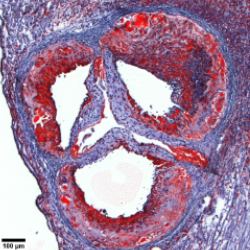
Inflammation plays a key role in the initiation, progression and destabilization of atherosclerotic plaque. Inflammatory pathways relating to atherosclerosis involve both innate and adaptive immune mechanisms. Some of the major mediators include monocytes, macrophages and dendritic cells, as well as proinflammatory cytokines and adhesion molecules. Platelets also contribute to different stages of atherosclerosis. They drive occlusive thrombus formation in complex plaques but also play an active role in inflammatory processes promoting early stages in atherosclerotic plaque growth.
The Trigatti Lab is actively investigating different pathways by which inflammatory mediators, including platelets, are involved in atherosclerotic cardiovascular disease.
